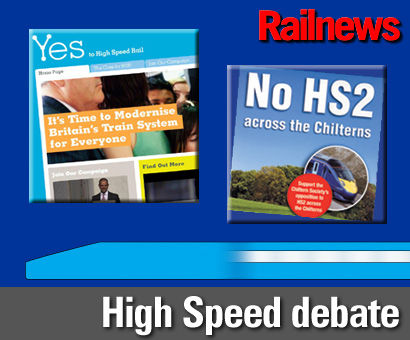MPs in the House of Commons have voted in favour of the first phase of HS2, which will run between London, Birmingham and Lichfield with an early extension to Crewe. The Hybrid Bill was approved at its third reading on 23 March by 399 votes to 44, and will now go to the House of Lords.
Opponents of HS2 accused the Government of 'rushing' the Commons process, although it is customary for major debates to accompany the second reading of a Bill, rather than the third.
The project continues to be mired in controversy, but the Government insists that construction will start next year with a target opening date of 2026. Lines onward to Manchester and Leeds are set to follow in 2033, while discussions are underway about links northward to Scotland involving a junction in the central belt with another high speed line connecting Edinburgh and Glasgow.
Plans for an east-west rail route across the Pennines are also being developed, with the alternative names of HS3 or NPR (Northern Powerhouse Rail). This is likely to involve some new construction plus some upgrades to existing railways. The first funding for development of this route to begin was announced by the Chancellor George Osborne in his Budget on 16 March, when he said: "I said we would build the Northern Powerhouse. We’re building the roads. We’re laying the track. We’re making the Northern Powerhouse a reality and rebalancing our country."
Transport secretary Patrick McLoughlin said the third reading vote in the House of Commons had brought HS2 'one step closer to reality'. He added: "As we enter this new phase I make three pledges: we will work closely with those communities affected by the HS2 route, we will keep a firm grip on costs and we will drive maximum value for money from this new railway."
Some MPs in some of the areas affected by phase one voted against the Bill, but opposition from communities in the Chilterns and Warwickshire has become less vocal in recent months.
However, a group proposing an alternative scheme has stepped up its efforts to achieve a rethink. The group, HSUK, wants an alternative route using motorway corridors to be considered instead. It is thought that the maximum speed on such a route would be 360km/h, rather than the 400km/h of HS2.
Colin Elliff and Quentin Macdonald of HSUK have reacted with dismay to the news of Parliamentary approval, at least in the lower chamber. They said: “It is deeply worrying that only one option for a high speed rail line has ever been presented to Parliament. There is no evidence that HS2, either with or without HS3, has ever been designed as a national network and there has been no consideration as to how the line will operate.
“It beggars belief that MPs can blithely nod through a scheme that has been so ill-informed from the outset. Although the task of designing a fully integrated national rail network is a highly technical matter, it is relatively simple to demonstrate HSUK’s overwhelming technical superiority as a national railway network.
“HS2 Ltd knows all about the superior HSUK alternative, but continues to pursue its own discredited proposals."
Meanwhile, HS2 Ltd has hosted the first of its Health and Safety briefing events for companies in its supply chain. The initiative includes a new brand – Safe at heart.
Ben Ruse of HS2 said: “To deliver our health and safety aspirations, it will be essential for our philosophy to be shared by our contractors and suppliers at every level. We have committed to only work with suppliers that share our values and will contribute to good safety leadership.”


